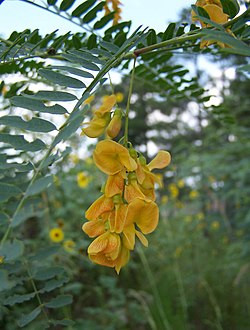Sesbania
| Sesbania | |
|---|---|
 |
|
| Sesbania drummondii | |
| Scientific classification | |
| Kingdom: | Plantae |
| (unranked): | Angiosperms |
| (unranked): | Eudicots |
| (unranked): | Rosids |
| Order: | Fabales |
| Family: | Leguminosae |
| Subfamily: | Faboideae |
| Tribe: |
Sesbanieae Adans. |
| Genus: |
Sesbania Scop. |
| Species | |
|
See text. |
|
| Synonyms | |
See text.
Sesbania is a genus of flowering plants in the pea family, Fabaceae, and the only genus found in tribe Sesbanieae. Riverhemp is a common name for plants in this genus. Notable species include the rattlebox (Sesbania punicea), spiny sesbania (Sesbania bispinosa), and Sesbania sesban, which is used in cooking. Plants of this genus, some of which are aquatic, can be used in alley cropping to increase the soil's nitrogen content. The species of rhizobia responsible for nitrogen fixation in Sesbania rostrata is Azorhizobium caulinodans.
Some 60 species are currently accepted, with about 39 still unresolved. The largest number of species are found in Africa, and the remainder in Australia, Hawaii, and Asia.
Fossil seed pods from upper Oligocene resembling Sesbania have been found in the Hungarian locality of Eger Wind-brickyard. The fossil species grew in a swampy and riparian environment.
...
Wikipedia
